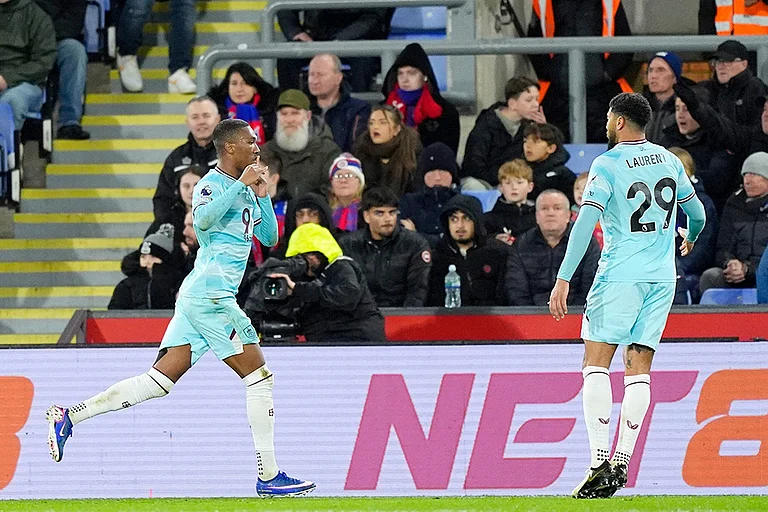- Deal flouted the Defence Procurement Procedures ’92
- No competitive bids; single vendor procurement
- The navy’s missile requirement drawn up to suit Barak’s specifications
- CAG draft report has questioned the Barak deal
- Initially only one missile system was approved; overnight six more cleared
***
So blatant were the violations that even officials in the defence ministry endorsing the deal had to note that several procedures were bypassed. Outlook is in possession of a note written by A.P. Sharma, joint secretary (navy) of the ministry of defence, building a case in favour of the purchase of seven Barak anti-ship missile defence systems (AMD) and 200 missiles. But even in this note the bureaucrat had put down the sordid history of the deal, probably to save his skin.
Here’s what Sharma said in his note:
- It was a single vendor procurement.
- Formal request for proposals were not invited from manufacturers other than M/s IAI of Israel which produces Barak.
- There were deviations from norms over the formulation of Naval Staff Qualitative Requirements.
- There were lapses over evaluation of the technical evaluation committee and selection of equipments.
- Price negotiations were affected because there was no competition.
Sharma wrote on September 12, 2000, the year the deal was okayed by the NDA government: "It will be seen from Para-16 of Note 187 ante that the provisions of Defence Procurement Procedures 1992 have not been followed in toto in processing of the acquisition proposal. The deviations from the stipulated procurement procedures relate to formulation of SQRs (staff qualitative requirements), issue of RFPs (request for proposals), inviting technical and commercial offers from prospective vendors, evaluation of technical proposals by TEC (technical evaluation committee) with reference to SQRs, seeking approval of TEC report, especially in regard to deviations from the SQRs and selection of equipments that meet SQRs and thereafter negotiations with the L-1 vendor based on the commercial proposal". Simply put, what the joint secretary was stating was that any negotiations with Barak were meaningless since no competitive bids were even considered.
It is not just officials in the ministry who smelt a rat. A draft report on the audit of the Barak acquisition by the Comptroller and Auditor General of India (CAG) which Outlook sourced from the defence ministry is categorical. "Despite availability of ten competing systems, the ministry and the navy acquired the Barak system on a single vendor basis". According to the report, the evaluation of other systems was a "one-sided paper evaluation", authentic technical specifications of competing AMD systems were not available with the navy because "techno-commercial offers were not invited from other manufacturers".
R.K. Jain, the then treasurer of the Samata Party, was caught on the Tehelka tapes saying he had received one crore from arms dealer Suresh Nanda to push the Barak deal.He alleged on tape that he passed on the money to the party president Jaya Jaitly. Jain claimed that Fernandes, after clearing one system for the aircraft carrier INS Viraat, had told him that he would get the import of six more systems approved if the files are sent up from the navy. "But tell your company that they should try and push from the down level". According to Jain, Fernandes also told him that after the approval of the first system the navy should say, "‘We can’t do with one. All ships are very important. Please allow us to buy all seven’. Then I’ll give them the permission to buy and purchase the rest of the six." And Jain claimed it happened within six months: "The file went to the boss again because Nanda managed to, you know, from the bottom he managed to get a letter in the name of George Fernandes, that "This is very important. Without this we can’t survive". It was because of Jain’s reference to Barak that it figured in the list of 15 deals examined by the Justice Venkataswami commission of inquiry looking into the Tehelka case. It was also investigated by the Central Vigilance Commissioner (CVC).
Says Admiral R.H. Tahiliani, former navy chief, associated with the anti-corruption organisation, Transparency International: "Violation of any norm is unacceptable. Single vendor procurement becomes inescapable when there are no competing systems available in the market. But when competing systems are available, it could have considerations other than that of larger service interests".
Israel began its attempts to enter the Indian defence market in 1994 and Barak was one weapon the Israelis pushed from the word go. Surprisingly, the father of "the Indian missile" and the then scientific advisor to the defence minister A.P.J. Abdul Kalam okayed the deal. Soon, the then defence minister Mulayam Singh Yadav got the deal approved for just one system to be installed in INS Viraat when the carrier would go in for a refit. Though the United Front government’s cabinet committee on security approved the decision in October 1997 as part of INS Viraat’s modernisation, it was the next government that pushed it further.
Admiral Vishnu Bhagwat, the chief of naval staff who was removed from service by theNDA government, had inherited the file seeking a single AMD system. The government had changed and Fernandes was the defence minister. The new establishment wanted seven systems, one for Viraat and others for the Brahmaputra-class vessels. But Bhagwat had approved only one, that too grudgingly because he wanted the indigenous Trishul missile to be developed. In what could be more than a coincidence, the proposal for seven systems was approved immediately after Bhagwat was sacked and replaced by Admiral Sushil Kumar who was handpicked by George Fernandes.
Bhagwat had this to say on the issue of single vendor procurement of Barak: "There were two competing systems—Kashtan and Shtil from Russia which were not compared with Barak. In fact, the navy locked up the earlier file and started a new one to justify the acquisition of seven systems". This could have deterred the auditors and the vigilance commission from arriving at conclusive evidence against lapses.
Last year’s monsoon session of Parliament was washed out over controversial defence deals, including Barak. The Public Accounts Committee, then headed by Buta Singh examining the CAG’s report on the Kargil era purchases, could not conclude its report. Singh wanted the government to share the CVC’s report on arms deals with the committee. The then Opposition which made this demand is now in government, but the report still remains a secret. George Fernandes was not available for comment.


























